Agricultural Systems ( IF 6.6 ) Pub Date : 2021-02-19 , DOI: 10.1016/j.agsy.2021.103101 Amy Marusak , Narjes Sadeghiamirshahidi , Caroline C. Krejci , Anuj Mittal , Sue Beckwith , Jaime Cantu , Mike Morris , Jason Grimm

|
Context
The U.S. food supply system relies heavily on vertically-integrated food supply chains (FSCs), which leverage large-scale production, streamlined operations, and centralized planning and control to provide consumers with a consistent supply of food. However, these FSCs were seriously disrupted upon the outbreak of the COVID-19 pandemic in spring 2020. During the height of the crisis, they were slow to respond to production system failures and sudden and widespread changes in consumer demand. By contrast, many regionalized food supply chains (RFSCs) proved to be adaptive and responsive to changes in demand and delivery requirements, quickly pivoting to distribute products directly to consumers safely.
Objective
The objective of this research is to explore how RFSCs can improve the resilience of the U.S. food supply system in the face of large-scale disruptions like the COVID-19 crisis. In particular, this research seeks to gain a greater understanding of how RFSCs can leverage logistics best practices for efficient and reliable distribution to consumers in normal times and during disasters.
Methods
This study presents seven case studies of RFSCs in Texas and Iowa that adopted logistics best practices to enable them to provide their customers with convenient and safe purchasing mechanisms during the COVID-19 emergency. A description of how the strategies adopted by each participant promote the achievement of the United Nations Sustainable Development goals is provided.
Results and conclusions
The successes experienced by these farmers and distributors at the height of the COVID-19 pandemic were a consequence of their willingness to adopt new distribution and logistics strategies. Collaboration among RFSC actors was a particularly effective strategy, as well as the adoption of scale-appropriate information and communication technologies, which helped to facilitate collaboration. Further, these case studies demonstrate how improved logistics performance allowed RFSCs to contribute to the health and well-being of their communities in a time of need.
Significance
These case studies demonstrate the potential of RFSCs to support a resilient and socially-sustainable food system that communities can rely on, even in the face of a major disruption like COVID-19. The adoption of logistics best practices helped these RFSCs to develop new organizational strengths that will likely support sustainable development in their communities after the crisis ends.
中文翻译:

复原力强的区域食品供应链并重新思考前进的方向:COVID-19大流行的主要收获
语境
美国食品供应系统严重依赖于垂直整合的食品供应链(FSC),它们利用大规模生产,简化的运营以及集中的计划和控制来为消费者提供稳定的食品供应。但是,这些FSC在2020年春季COVID-19大流行爆发时受到了严重破坏。在危机最严重的时期,它们对生产系统故障以及消费者需求的突然而广泛的变化反应迟钝。相比之下,事实证明,许多区域食品供应链(RFSC)都是适应性强的,并能应对需求和交付要求的变化,从而迅速地将产品安全地直接分发给消费者。
客观的
这项研究的目的是探讨RFSC如何在面对诸如COVID-19危机之类的大规模破坏时提高美国食品供应系统的弹性。尤其是,本研究旨在进一步了解RFSC如何利用物流最佳实践在正常时间和灾难期间向消费者进行有效而可靠的分配。
方法
这项研究提出了七个德克萨斯州和爱荷华州RFSC的案例研究,这些案例采用了物流最佳实践,以使它们在COVID-19紧急情况下能够为客户提供方便,安全的购买机制。介绍了每个参与者采用的战略如何促进实现联合国可持续发展目标。
结果与结论
这些农民和分销商在COVID-19大流行高峰时所取得的成功,是他们愿意采用新的分销和物流策略的结果。RFSC参与者之间的合作是一项特别有效的策略,并且采用了适合规模的信息和通信技术,这有助于促进合作。此外,这些案例研究表明,改善的物流绩效如何使RFSC在需要的时候为社区的健康和福祉做出贡献。
意义
这些案例研究表明,即使面对像COVID-19这样的重大破坏,RFSC仍可能支持社区可以依靠的有韧性和社会可持续性的食品系统。物流最佳实践的采用帮助这些RFSC建立了新的组织优势,这将有可能在危机结束后支持其社区的可持续发展。



























 京公网安备 11010802027423号
京公网安备 11010802027423号